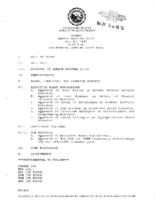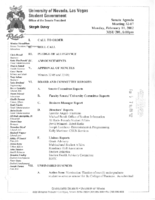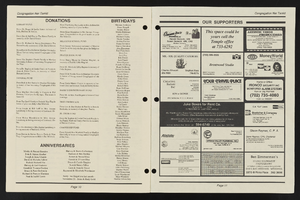Search the Special Collections and Archives Portal
Search Results

James L. Hogan interview, March 11, 1978: transcript
Date
Archival Collection
Description
On March 11, 1978, collector Patty L. Baratti interviewed James Hogan (born April 6th, 1909 in Winton Place, Ohio) at his home in Las Vegas, Nevada. In this interview, Hogan talks about his time working with the telephone company in Arizona and moving to Las Vegas, Nevada. He discusses his time working on grazing rights and cattle ranching in Nevada and how planning went to ensure that farms were able to have land to graze their animals. He speaks about dealing with farmers, corporations, and the government and the frustrations he had to deal with before there were set laws about grazing. He also discusses the change from mainly family farms in Nevada to corporations owning much of the farmland.
Text

Interview with Ian Dominic Zabarte, April 4, 2007
Date
Archival Collection
Description
Access note: Audio temporarily sealed. May not quote in any form without written permission from interviewee
Text

Meeting minutes for Consolidated Student Senate University of Nevada, Las Vegas, May 30, 1991
Date
Archival Collection
Description
Text

Meeting minutes for Consolidated Student Senate University of Nevada, Las Vegas, February 11, 2002
Date
Archival Collection
Description
Text

Meeting minutes for Consolidated Student Senate University of Nevada, Las Vegas, February 07, 2002
Date
Archival Collection
Description
Text

Preprint, Where I Stand: The Record of a Reckless Man, by Hank Greenspun with Alex Pelle, 1966
Date
Archival Collection
Description
Book proof with annotations from editors in the margins.
Text

Sandra Gray oral history interview: transcript
Date
Archival Collection
Description
Oral history interview with Sandra Gray conducted by Elsa Lopez and Barbara Tabach on December 13, 2019 for the Latinx Voices of Southern Nevada Oral History Project. In this interview, Dr. Gray discusses her family history, and describes how her parents are immigrants from Durango, Mexico and moved from East Los Angeles, California to East Las Vegas, Nevada in 1991. After getting her bachelor's degree in psychology from the University of Nevada, Las Vegas (UNLV) she started a behavioral health agency that provided rehabilitative mental health services to children primarily in the foster care system. She went on to earn a master's degree in mental health counseling, a master's in psychology, and a doctoral degree in clinical psychology. She is the founder of Empower LV, which strives for equitable access to sports and tutoring. Dr. Sandra Gray is also the owner and operator of Innovation Behavioral Health Solutions, LLC.
Text

Nora Mirabal interview, August 30, 2019: transcript
Date
Archival Collection
Description
Interviewed by Elsa Lopez and Barbara Tabach. Cuban refugee family by way of Spain and then to the US; arrived in Las Vegas in 1973 when Nora was 9 years old. Struggled in youth but rises up as embraces educaton. Currently is Assistant Director of Academic Partnership at CSN.
Text

Maria Casas interview, June 12, 2019: transcript
Date
Archival Collection
Description
Interviewed by Maribel Estrada Calderón. Farmersville is described as a small town between, Exeter and Visalia, California populated by Mexican American farm workers. It is in this small town, where UNLV History Professor Maria Raquél Casas spent her childhood raised along with her sisters and brothers. In her interview, Dr. Casas describes how growing up in this small town with her traditional Mexican family influenced the person she is today. While working alongside her family in the fields, Dr. Casas decided that she would strive to obtain an education. Through hard work and constant support from her sister, Dr. Casas attended Fresno State, where she discovered her love for history. Upon completing her undergraduate program, Dr. Casas made the decision to further her education by pursuing a master's at Cornell University. At Cornell, she faced discouraging professors who believed she would not be able to complete the master's program let alone pursue a PhD program. Despite these demoralizing professors, Dr. Casas completed her program and was admitted into University of California Santa Barbara's history program. Dr. Casas never forgot her roots or the significance of her presence in the majority white academic spaces she attended during her academic journey. When she arrived at UNLV, she continued to strive for more Latino representation in both the student population and in the school faculty. During her tenure at UNLV, Dr. Casas has served as an advisor for multiple Latino student organizations including MEChA and SoL. Dr. Casas has witnessed much progress in Latino representation at UNLV, but she believes there is still much work left to be accomplished.
Text

